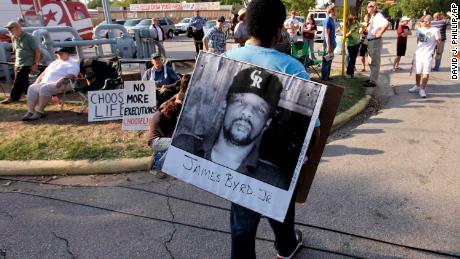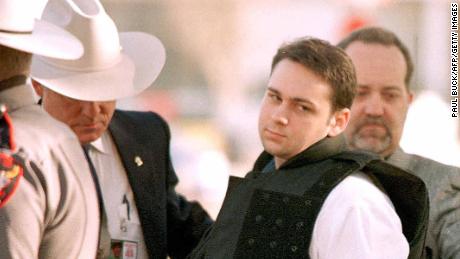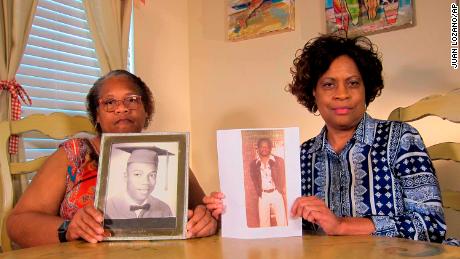Barring a last-minute stay, John William King, 44, will be the second person executed in Byrd's 1998 death. Lawrence Russell Brewer died by lethal injection in 2011. A third man, Shawn Berry, was sentenced to life in prison. While most murders are brutal, the viciousness of Byrd's killing shocked the world. NBA star Dennis Rodman came forward to pay for Byrd's funeral. Filmmakers produced multiple documentaries. Artists including Geto Boys, Drive-By Truckers and Will Smith referenced the violent saga in their songs. Maryland poet laureate Lucille Clifton penned an ode to Byrd. Most importantly, the 49-year-old's slaying spurred Texas and Congress to push through hate crime legislation. The federal act is often associated with the killing of Matthew Shepard, a gay student beaten to death in Wyoming, but the full name of the law is the Matthew Shepard and James Byrd Jr. Hate Crimes Prevention Act.King has long maintained his innocence, once sending a letter to the Dallas Morning News that would later be used against him. He has said that the evidence presented in his case was circumstantial and that Berry was solely responsible for Byrd's death. King has repeatedly appealed his guilty verdict, claiming ineffective assistance from his counsel, but a federal appeals court upheld his conviction last year, and the US Supreme Court declined to hear his case in October. Some of Byrd's family members have spoken out against capital punishment for his killers. Byrd's sister, Betty Boatner, told CNN in 2011, after Brewer's execution, that she "forgave him 13 years ago." His son, Ross, joined protests decrying Brewer's execution, saying, "You can't fight murder with murder." Ross' sister, Renee Mullins, said after Brewer's execution that she preferred a life sentence for her dad's killer.  "I don't feel justice was served," she told CNN. "Lawrence Brewer was just given an option to take some drugs in his arm and go to sleep. My father wasn't given that option. He was brutally tortured for 3 miles, until he was dismembered."
"I don't feel justice was served," she told CNN. "Lawrence Brewer was just given an option to take some drugs in his arm and go to sleep. My father wasn't given that option. He was brutally tortured for 3 miles, until he was dismembered."
A modern-day lynching
It's hard to describe what happened to Byrd as anything other than a modern-day lynching: King, Brewer and Berry picked up Byrd and drove him to a secluded area where they beat him and spray-painted his face before tying a logging chain around his ankles and dragging him behind a pickup truck for almost 3 miles. Police found most of Byrd's body June 7, 1998, a Sunday, in front of a church outside Jasper, Texas, about a two-hour drive northeast of Houston, not far from the Louisiana border. The church was home to a black cemetery. The rest of Byrd's body was found about a mile and a half away, court records indicate."Byrd's death and dismemberment were caused, according to the pathologist, when he was slung into a culvert on the side of the road," according to the records. A trail of blood led investigators to a field that showed signs of a scuffle. There, police recovered a lighter engraved with "KKK" and "Possum," cigarette butts, a button from Byrd's shirt, Byrd's baseball cap and a wrench inscribed with the name "Berry." Byrd's acquaintances told police they'd seen Byrd at a party the night of June 6, that he'd left around 2 a.m. and was later seen riding in the bed of a pickup with three white men in the cab. After stopping Berry for a traffic violation June 8, 1998, police found a tool set matching the wrench, blood spatters under the truck and a rust stain in the pattern of a chain. The blood matched Byrd's, and the tires on Berry's truck matched tracks at the scene. The cigarette butts contained King's DNA, and police learned King's nickname was Possum. Investigators also found a 24-foot logging chain in a covered hole in the woods behind a home belonging to King's and Brewer's friend. Another damning piece of evidence was a wall scribbling in King's cell in which he described Berry, who had confessed and cooperated with police, as a "snitch ass traitor."
Byrd's acquaintances told police they'd seen Byrd at a party the night of June 6, that he'd left around 2 a.m. and was later seen riding in the bed of a pickup with three white men in the cab. After stopping Berry for a traffic violation June 8, 1998, police found a tool set matching the wrench, blood spatters under the truck and a rust stain in the pattern of a chain. The blood matched Byrd's, and the tires on Berry's truck matched tracks at the scene. The cigarette butts contained King's DNA, and police learned King's nickname was Possum. Investigators also found a 24-foot logging chain in a covered hole in the woods behind a home belonging to King's and Brewer's friend. Another damning piece of evidence was a wall scribbling in King's cell in which he described Berry, who had confessed and cooperated with police, as a "snitch ass traitor."
'We have made history and shall die proudly remembered'
Though the motive was never specifically outlined, race was a theme in King's trial. Prosecutors presented evidence that King had been an "exalted cyclops" of the white supremacist Confederate Knights of America and regularly drew lynching scenes.  His tattoos included a burning cross, the double lightning bolt insignia of Adolf Hitler's paramilitary Schutzstaffel, a robed Ku Klux Klansman, a swastika, the words "Aryan Pride" and a black man hanging from a tree. Gang experts testified King was recruiting others to his cause — an all-out race war — and that leaving Byrd's body in front of the church, rather than obscuring it, "demonstrated that the crime was meant to spread terror."Prosecutors also presented a note they said King had tried to smuggle to Brewer in prison, according to court records. "Seriously, though, Bro, regardless of the outcome of this, we have made history and shall die proudly remembered if need be," King wrote, signing it, "Much Aryan love … Possum."Three years after King's conviction, attorney Pat Nolan with Prison Fellowship wrote a piece for The Washington Times sharing King's account of how white supremacists had conspired with prison guards to put King in the black section of a prison in 1995. A high school dropout, King was serving his second prison stint for burglary. The black inmates, Nolan claiRead More – Source
His tattoos included a burning cross, the double lightning bolt insignia of Adolf Hitler's paramilitary Schutzstaffel, a robed Ku Klux Klansman, a swastika, the words "Aryan Pride" and a black man hanging from a tree. Gang experts testified King was recruiting others to his cause — an all-out race war — and that leaving Byrd's body in front of the church, rather than obscuring it, "demonstrated that the crime was meant to spread terror."Prosecutors also presented a note they said King had tried to smuggle to Brewer in prison, according to court records. "Seriously, though, Bro, regardless of the outcome of this, we have made history and shall die proudly remembered if need be," King wrote, signing it, "Much Aryan love … Possum."Three years after King's conviction, attorney Pat Nolan with Prison Fellowship wrote a piece for The Washington Times sharing King's account of how white supremacists had conspired with prison guards to put King in the black section of a prison in 1995. A high school dropout, King was serving his second prison stint for burglary. The black inmates, Nolan claiRead More – Source
[contf] [contfnew] 
CNN
[contfnewc] [contfnewc]






